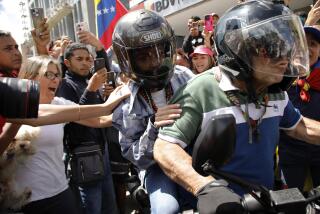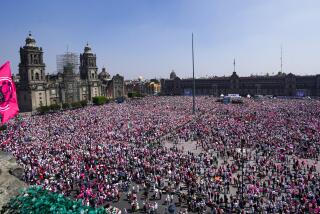Anti-Sandinista March Protests Extended Curbs
- Share via
MANAGUA, Nicaragua — Three hundred activists of Nicaragua’s unarmed opposition Saturday exploded firecrackers and shouted “Down with the Sandinistas!” in a protest march against a renewed state of emergency.
The leftist Sandinista government authorized the march, and one high official said there will be room for more peaceful dissent.
But opposition leaders expressed frustration with the sweeping suspension of civil rights under the state of emergency. Some said it may hinder their efforts to mount a major challenge to the Sandinistas in municipal elections promised later this year.
Rights Restricted
With Nicaragua’s new constitution signed into law Friday, the internal opposition had hoped for an easing of the civil rights restrictions, in force since 1982. But President Daniel Ortega decreed their extension for another year to help fight U.S.-backed rebels based in Honduras.
Keeps Newspaper Closed
In doing so, Ortega kept the opposition newspaper La Prensa closed, a critical Roman Catholic bishop in exile, the Catholic radio station off the air and about 2,500 suspected rebel collaborators in prison without charge.
Leaders of three major opposition parties, the Social Christians, Liberal Independents and Popular Social Christians, said in interviews that the Reagan Administration is equally to blame for the situation. They said its support for the five-year-old armed insurgency gave the Sandinistas a plausible excuse to crack down on all dissent.
Opposition Hindered
“The civic opposition is caught in a vice,” said Mauricio Diaz, the Popular Social Christian leader. “On one side is external military pressure. On the other, the Sandinistas use this pretext to keep the country under one-party control.”
Legal opposition to the government ranges from the Communist left to the moderate right. It comes from six parties with 35 of 96 seats in the Sandinista-dominated National Assembly, three parties that refused to take part in the 1984 assembly elections and four labor federations.
The emergency decrees hinder the opposition by suspending such guarantees as the right to organize new unions, to strike and to assemble without state permission.
However, opposition leaders said a few strikes and dissident gatherings have been tolerated in recent months. They said they were planning to hold rallies and open new party offices in coming weeks to test the regime.
Mile-Long March
In an interview Thursday, the Sandinista secretary of the assembly, Rafael Solis, said political parties that recognize the new constitution “will have space to make criticisms, to hold activities, even in the streets, as long as they get permission.”
“The Sandinista (National Liberation) Front feels strong enough to let some of this activity happen but not strong enough to take off all the chains,” said Adan Fletes, a leader of the Social Christian Party.
Saturday’s march in Managua was organized by the Social Christians, the Nicaragua Workers Central and the union representing employees of La Prensa, closed six months ago.
It commemorated the murder of La Prensa editor Pedro Joaquin Chamorro nine years ago for his opposition to the right-wing rule of Anastasio Somoza, who was overthrown in a Sandinista-led uprising in 1979.
‘Corrupt Dictatorship’
“Today, as then, we have a corrupt dictatorship that subjects the people to torture, imprisonment, hunger and misery,” declared Erick Ramirez, president of the Social Christians, in a speech near Chamorro’s grave. “Today we start a campaign of popular protests to defeat this new dictatorship.”
It was the third such anti-government demonstration this week. Each drew several hundred participants.
Some said they assumed the police permitted the demonstrations to avoid tainting the new constitution with a negative image abroad. At the signing ceremony Friday, Ortega told visiting lawmakers from 10 nations that the new charter was “democratic and pacifist.”
However, Ramirez said police refused to let several busloads of party activists leave the cities of Granada, Matagalpa and Leon for Saturday’s march in Managua. A businessman who printed flyers for a march on Friday was arrested, he said. The official Sandinista newspaper Barricada said working-class people in Managua supported a hard line against dissent to keep the armed rebels from creating an “internal front” in major cities. Thursday and Friday it published interviews with 18 workers, all supporting a renewal of the emergency decree.
Overshadows Elections
Opposition leaders said the emergency overshadowed the most tangible provision of the new constitution--elections in 142 municipalities.
The government, which now appoints all mayors, is committed to holding elections this year but has set no date.
Solis said the ruling party is prepared to lose control of some cities--an occurrence that would give the internal opposition its first real power in the Sandinista era.
Four parties--the Socialists, Social Christians, Popular Social Christians and Communists--began talks last year on joining forces in the election. But now their leaders say they might not take part unless press freedom and the right to organize are formally restored.
“We cannot wait for the Sandinistas to officially call these elections,” said Fletes, the Social Christian leader. “We have to organize now as if the campaign were under way. But just about everything we have to do is still illegal. We are not sure how far we can go.”
More to Read
Sign up for Essential California
The most important California stories and recommendations in your inbox every morning.
You may occasionally receive promotional content from the Los Angeles Times.













